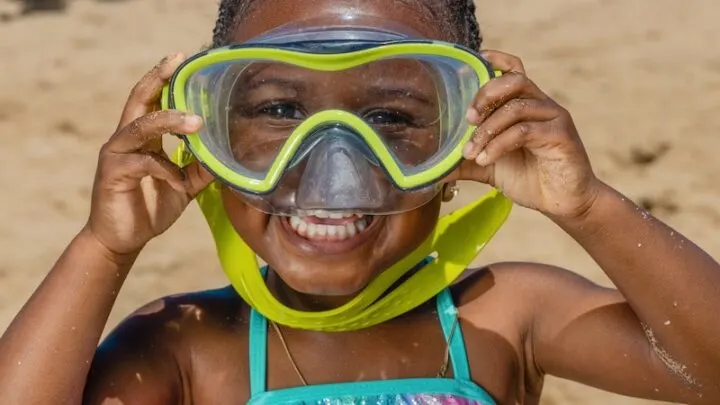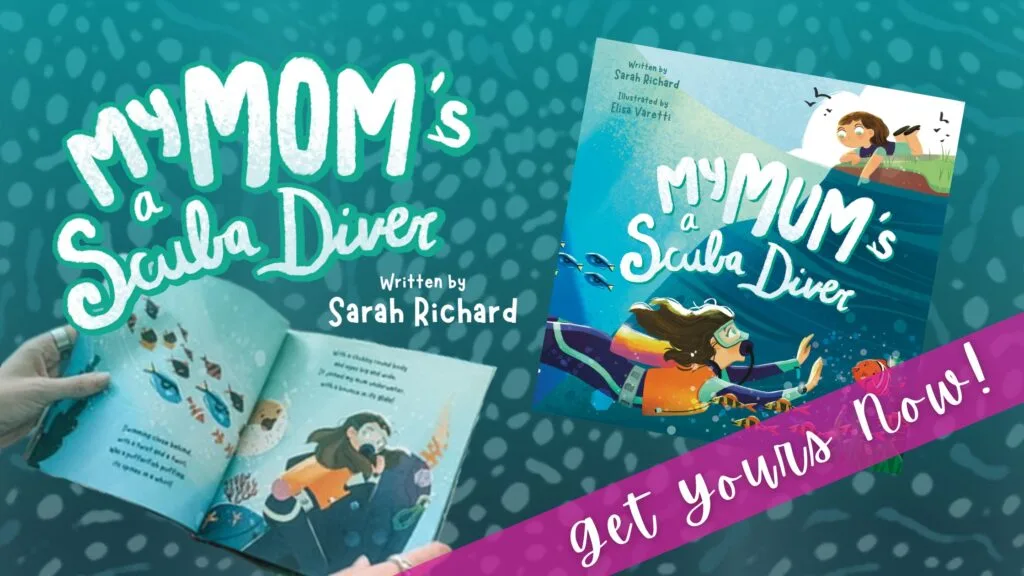The biggest regret many scuba divers have is not starting soon enough. Which means, for many diving moms, getting their kids certified is simply a no-brainer. After all, according to DEMA, over half (54%) of adult divers have kids between the ages of 11 and 17.
But are your kids ready? What learning method will they benefit from most? And what are all the options for getting them certified? From assessing a child’s interest and aptitude to choosing the method and timing for training, diving moms have a lot of decisions to make.
By guest writer Jeanette Smith
How old do they have to be to qualify?
Each training agency has their own requirements and prerequisites for certifying minors. PADI, NAUI, SDI, and SSI all offer classes to divers as young as 10 and issue a Junior certification that can be upgraded to a traditional certification when the diver reaches 15. Even BSAC recently dropped their minimum age from 12 to 10. Other agencies may have different standards. Prerequisites (such as a swim test) for classes are often the same for both junior and adult divers. There may also be additional paperwork or educational materials your child will go through before certification.
Junior certifications have various limitations that moms should be aware of. These often include depth limits, limits on what specialty certifications they can earn, and the promise that they will always dive with a parent or adult. Check with the shop you’re certifying with to understand which certification your kids are getting and the limitations associated with that certification level.
Are they even interested in scuba diving?
Learning to scuba dive is a big commitment and a serious responsibility. If your child has been talking about the ocean for years, snorkels during all your diving adventures, and dreams of being a marine biologist, it’s pretty clear they would be interested in scuba. But it’s always best to have an open, no-pressure conversation with kids about it.
As an instructor, I’ve heard more than one junior student say the reason they are in class is because of a parent and not their own interest. One of the best ways to gauge interest is by having them try scuba without the commitment to a full course. Most stores, resorts, and agencies have a “Try Diving” program of some sort. This type of course is ideal for all kids, regardless of their interest, because it will also help assess their readiness.
Are they ready to scuba dive?
Physically? Mentally? Emotionally? Maturity-wise? There are a lot of factors that go into assessing a child’s readiness or aptitude to complete a full scuba certification course—and age isn’t always one of them! I’ve had 10-year-olds who were better ready to be divers than teenagers.
Physically, kids should be confident swimmers. It’s ideal if they can lift and stand in their gear and that they can spend several hours in the water (with a wetsuit) without getting cold. Mentally, they need to be able to concentrate and have good listening skills. Emotionally, they need to have a vested interest in the course. And maturity-wise, you need to be able to trust them as your buddy if you’re having an underwater emergency.
External factors, such as the timing of and conditions for classes, can also impact readiness. Taking a course during the school year might overwhelm some kids when coupled with the academics and time needed for both school and scuba. At the same time, some kids “turn it off” during summer and would have difficulty concentrating. You’ll also want to consider local conditions, such as the water temperature and clarity during different parts of the year. Analyze these external factors and make sure there are no additional obstacles that might be a barrier to your child’s certification.
How to get your kids certified
Now that you’ve assessed your child’s interest and aptitude for scuba, it’s time to choose how to get them certified. The right environment and method can make all the difference in their enjoyment and success within their program. Here are a few of the options available for youth certifications.
What kind of class should I choose?
Perhaps the most practical option, a traditional scuba class from your local scuba store can certainly get your children certified. One factor to consider would be whether the academic portions are completed online or in person. With pandemic-era learning, most kids are used to both methods, but they likely have a preference so it’s best to ask them what they would like if they have the choice.
Also, class size and pacing can make a big difference. Confident kids, those well-versed in interacting with adults, and kids used to rigorous learning (be it in the classroom or in an extracurricular activity) might do just fine in a weekend-length class with mostly adults. Other kids would benefit from a smaller class size, more students their own age, and more or longer sessions.
Vacation Courses
If you want to get away from it all or you’re worried the local diving won’t be the ideal conditions for your kids, vacation courses are also available. Many agencies offer the chance to do online learning, pool sessions locally, and then checkout dives on holiday. Breaking up the training in this way helps kids not feel overwhelmed with what they’re learning and how fast.
Kid’s Camps
Many kids thrive in and better enjoy scuba classes when they participate with students their own age, and there are many types of kid’s camps available. Ask your local dive store if they have any special classes reserved just for junior divers. Or look for summer adventure camps that offer scuba. Some of these, like Kid’s Sea Camp, offer opportunities for the whole family. Other programs, such as Broadreach or Odyssey Expeditions, combine scuba with sailing, hiking, and community service projects. I’ve even taught at a military summer camp that offered scuba to the campers. Kid’s scuba programs are everywhere.
Academic Programs
Though not common for lower grade levels, some schools and extracurricular programs may offer academic credit for taking a scuba diving course. For example, the American Council on Education assigns varying continuing education credits for different certification courses. Organizations such as scouting groups may also offer credit for courses and can help find options to get kids certified.
Private Lessons
There are many reasons to choose private lessons for your kids. Personalized attention can help with in-water comfort and overcoming any learning obstacles. Families with multiple kids getting certified can do so as a private group, allowing everyone to be there in support of each other. Not every child needs a private lesson, but it’s something to look into, especially if your child has tried traditional methods and been unsuccessful so far.
Scuba diving opens up a whole new world of adventure and possibilities for kids – just like it did for Grace and Indigo. Yet, getting them certified is a serious endeavor and it’s important for moms to stop and consider all the factors and possible paths to certification. Check out what other Mums that Scuba say in our Facebook group. And work with your local dive shop to plan a certification course for your kids that will work best for everyone. Then go and enjoy your new dive buddies!

Jeanette Smith is a freelance writer and editor based in Dallas, Texas. She is the Curriculum Director for DIY MFA and Contributing Editor to Rare magazine. She holds a BA in English literature from Smith College. When not at her keyboard, you can find her teaching a scuba diving class, making a craft, or posting pictures of her cats on Instagram (@jeanettethewriter).


